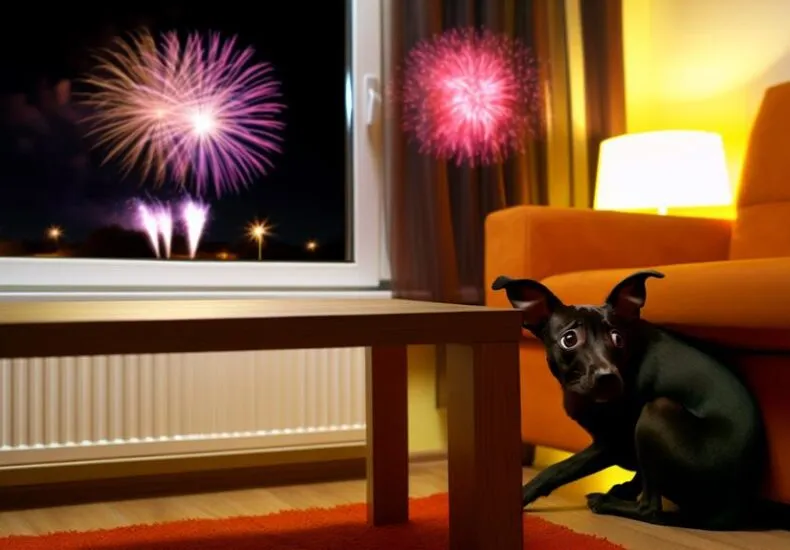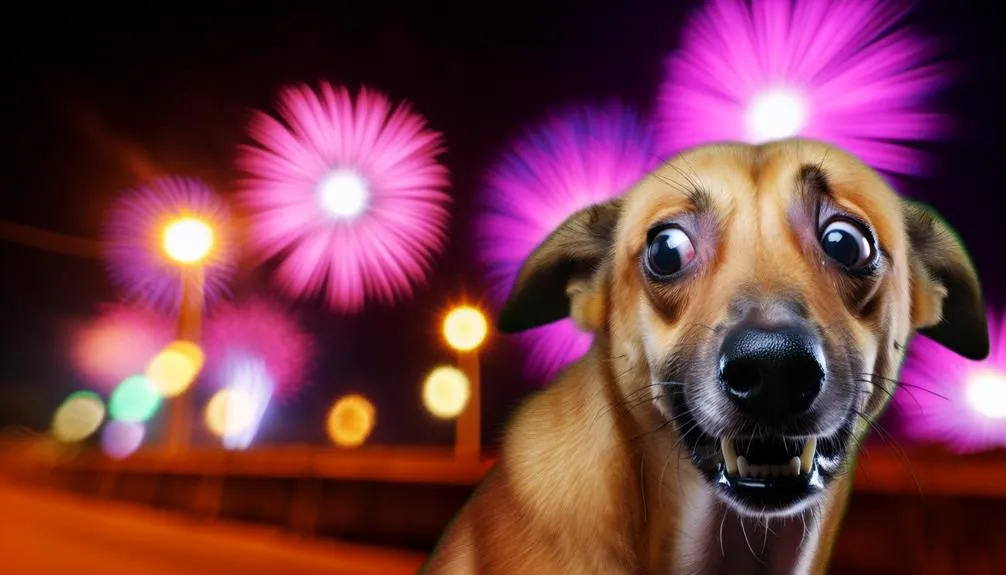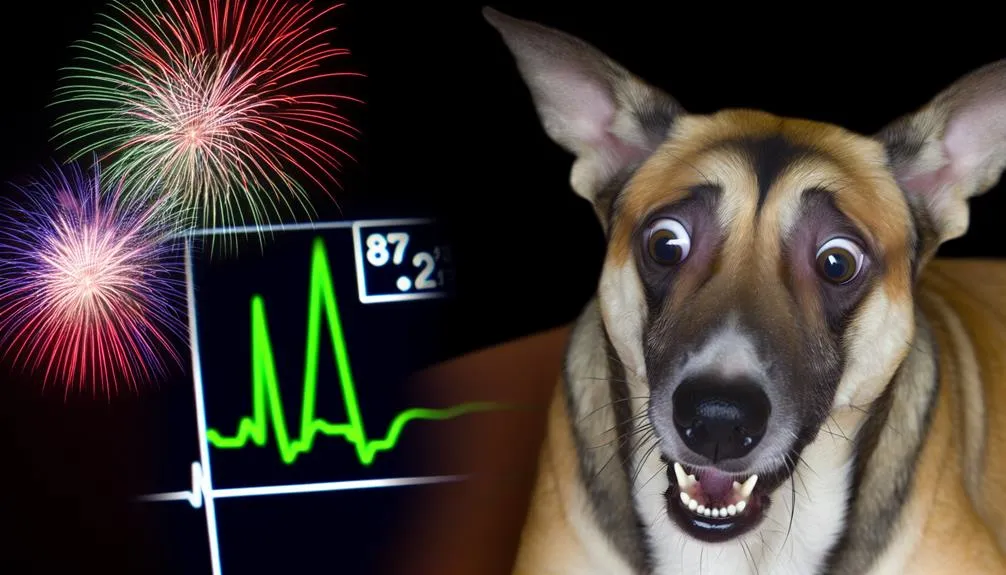
What Causes Dog to Fear Fireworks
You might notice your dog trembling or hiding when fireworks start, and it's not just a simple reaction to noise. Dogs have a remarkable ability to hear sounds at frequencies we can't even perceive, which plays a significant role in their fear of fireworks. Coupled with their past experiences and possibly inherited traits, this sensitivity can create an overwhelming sense of anxiety. But what exactly drives this fear deeper? Understanding the underlying factors can help you find ways to support your dog during these distressing moments.
Understanding Canine Hearing Sensitivity
When it comes to understanding why many dogs fear fireworks, one key factor is their remarkable hearing sensitivity. Canine anatomy is specifically designed for heightened auditory perception, enabling dogs to hear sounds at frequencies far beyond human capabilities. While humans can typically hear sounds up to 20 kHz, dogs can detect frequencies as high as 65 kHz or more. This extraordinary range makes them particularly attuned to sharp, sudden noises like fireworks, which can be startling and overwhelming.
The loud booms and crackles of fireworks can create an auditory environment that's disorienting for your dog. They don't just hear these sounds; they feel them, too. The vibration and intensity can be physically uncomfortable, causing anxiety and fear. Imagine being in a crowded place where loud noises erupt unexpectedly—it's no wonder that many dogs react with distress.
Moreover, the anatomical structure of a dog's ear amplifies sounds, making those loud explosions even more pronounced. This means that what seems like a celebratory event to you can feel like a terrifying assault on their senses. Understanding this sensitivity is essential for providing effective support to your dog during fireworks displays. By recognizing the challenges posed by their auditory perception, you can take proactive measures, such as creating a safe, quiet space for them to retreat to, ensuring they feel secure and comforted when the skies light up with noise.
The Role of Past Experiences
Fear can be a powerful influence on a dog's behavior, particularly when shaped by past experiences. If your dog has faced past trauma, like being exposed to loud noises without a safe space to retreat to, the fear of fireworks may be intensified. Dogs from rescue backgrounds often carry these scars, as their previous lives may have exposed them to neglect or frightening situations.
Conditioning methods can also play a significant role in how your dog reacts to fireworks. If they've had negative experiences in the past, every loud bang can trigger a memory of distress. For instance, if your dog was once left alone during a fireworks display, their anxiety may be compounded by the fear of abandonment.
Your reactions as an owner can either help or hinder your dog's coping strategies. If you react with anxiety yourself, your dog may pick up on this and become even more fearful. Conversely, remaining calm and providing reassurance can help your dog feel secure.
Additionally, exposure levels can influence how your dog responds to fireworks. Gradual exposure to similar sounds in a controlled environment can be beneficial, provided it's done carefully and compassionately. Creating safe spaces where your dog can retreat during fireworks can also ease their anxiety. By understanding the role of their past experiences, you can help your dog develop healthier coping strategies and foster a sense of security during stressful events.
Genetic Predisposition to Anxiety

Many dogs may inherit a genetic predisposition to anxiety, making them more sensitive to stimuli like fireworks. Research indicates that certain breeds are more prone to anxiety due to hereditary traits and genetic factors. If your dog seems particularly distressed during fireworks, it might not just be a matter of environment or past experiences; their genetics could play a significant role.
To help you understand how this predisposition can manifest, consider the following table:
| Breed | Hereditary Traits | Anxiety Level |
|---|---|---|
| Labrador Retriever | Friendly, but can be anxious | Moderate |
| German Shepherd | Loyal, protective, often anxious | High |
| Chihuahua | Alert, but may be overly sensitive | Very High |
This table illustrates that while all dogs can experience anxiety, some breeds are genetically wired to be more reactive. The inherited genetic factors can amplify their stress response, especially in situations like fireworks. It's essential to recognize that your dog's fear isn't simply a behavioral issue; it can stem from deep-rooted biological traits.
Understanding your dog's genetic background can help you provide better support. If you know your dog belongs to a breed that's predisposed to anxiety, you might want to explore training methods or consult a veterinarian for anxiety management strategies. By acknowledging these hereditary traits, you can foster a calmer environment for your beloved pet during stressful events like fireworks.
Environmental Factors and Noise
Many dogs have varying levels of sound sensitivity, which can greatly heighten their fear during fireworks. Environmental triggers, such as sudden loud noises or chaotic settings, can amplify this stress, making it harder for them to cope. Understanding these factors is essential for creating a supportive environment that helps your dog feel safe.
Sound Sensitivity in Dogs
Understanding sound sensitivity in dogs involves recognizing how environmental factors and noise can greatly impact their behavior and emotional well-being. Dogs perceive sounds with a level of intensity far beyond what humans experience. This heightened sensitivity can lead to anxiety, especially during loud events like fireworks. The sudden, unpredictable nature of these noises can overwhelm your furry friend, triggering fear responses.
To help your dog cope, consider implementing sound therapy and calming techniques. Sound therapy, such as playing soft music or white noise, can create a comforting auditory environment that masks distressing sounds. Additionally, using calming techniques like providing a safe space or engaging in gentle play can help ease your dog's anxiety.
It's essential to be aware of your dog's unique reactions to various sounds. Some dogs may respond better to desensitization exercises, where they gradually get exposed to recorded noises at lower volumes. By understanding your dog's needs and creating a supportive environment, you can considerably reduce their fear and anxiety during noisy situations. Remember, patience and empathy are key in helping your beloved pet navigate their sound sensitivities.
Environmental Triggers and Stress
Environmental factors play an essential role in shaping a dog's fear responses, particularly during events like fireworks. Dogs are sensitive creatures, and their reactions can be influenced by their surroundings. If your dog lives in a noisy environment, it may be predisposed to stress during loud events.
To illustrate, consider the following table:
| Environmental Trigger | Impact on Dog's Behavior |
|---|---|
| High Noise Levels | Increased anxiety and fear |
| Lack of Safe Space | Heightened stress response |
| Limited Environmental Enrichment | Boredom and fear magnification |
When you provide environmental enrichment, like toys or a safe space to retreat, you can help mitigate stress. Additionally, implementing noise reduction strategies, such as white noise machines or soundproofing, can create a calmer atmosphere for your dog.
Understanding these environmental triggers allows you to take proactive measures. By creating a secure and enriching environment, you're not only reducing your dog's fear but also enhancing their overall well-being. Remember, your actions and the environment you curate can make a significant difference in how your dog experiences stressful events like fireworks.
Physiological Responses to Stress

When your dog hears fireworks, their body reacts with a surge of stress hormones, which can lead to a range of physiological changes. This release not only heightens their anxiety but can also create sensory overload, making the experience even more overwhelming. You may notice behavioral changes as they struggle to cope, highlighting the profound impact that these stressful situations have on their well-being.
Stress Hormone Release
Many dog owners have witnessed their pets' distress during fireworks, often feeling helpless as they watch their furry friends tremble in fear. This reaction isn't just behavioral; it's deeply physiological. When a dog encounters a stressful event like fireworks, their body releases stress hormones, primarily cortisol and adrenaline. These hormones prepare the body for a fight-or-flight response, causing rapid heart rates and heightened senses.
For your dog, this surge of stress hormones can lead to anxiety, making them more vulnerable to panic. You might notice them panting, pacing, or trying to hide, all signs that their body is overwhelmed by fear. Understanding this response is essential for effective anxiety management. By recognizing that your dog's fear is rooted in a physiological reaction, you can better empathize with their experience.
To help mitigate this stress response, consider creating a safe space, using calming aids, or consulting a veterinarian for behavioral strategies. Addressing the release of stress hormones can appreciably improve your dog's ability to cope with fireworks, ultimately leading to a more peaceful experience for both of you.
Sensory Overload Impact
The physiological effects of stress hormones are compounded by sensory overload, which can intensify a dog's fear during fireworks. Dogs have heightened sensory processing abilities, allowing them to hear and smell things more acutely than humans. When fireworks erupt, the loud bangs and bright flashes overwhelm their sensitive senses. This overload can trigger an anxiety response that's hard for them to manage.
You may notice your dog panting, pacing, or trying to hide. These reactions are indicative of the stress they're experiencing as their bodies release adrenaline and cortisol. In this heightened state, it's difficult for them to find a sense of calm. Understanding this can help you be more empathetic toward your pet during these stressful events.
Effective anxiety management strategies can make a significant difference. Providing a safe space where your dog feels secure, using soundproofing techniques, or even considering calming products, can help ease their distress. Recognizing that sensory overload plays an essential role in their fear response allows you to better support your dog and create a calmer environment during fireworks, ensuring they feel safe and protected.
Behavioral Changes Observed
Often, dogs exhibit noticeable behavioral changes during fireworks, reflecting their physiological responses to stress. You might observe behavioral signs such as pacing, hiding, or excessive panting. These reactions are rooted in their instinctual responses to perceived threats. As the loud noises erupt, your dog's heart rate can increase, leading to restlessness and anxiety.
You may notice your dog trying to escape or seeking comfort, which indicates their discomfort and fear. Recognizing these behavioral changes is vital, as they can provide insight into how your dog is feeling during such stressful events.
Implementing effective coping strategies can help alleviate their anxiety. Creating a safe space, like a cozy den with familiar items, can provide your dog with a sense of security. Additionally, you might consider using calming products such as anxiety wraps or soothing music to help distract them from the noise.
Understanding their behavioral changes not only fosters empathy but also empowers you to support your dog through these challenging experiences. By addressing their fears and providing comfort, you can help them navigate the stress of fireworks more effectively.
Importance of Socialization and Training
Socialization and training play an essential role in helping dogs cope with the stress of fireworks. When you introduce your puppy to various environments, sounds, and experiences early on, you're setting a foundation for a more resilient adult dog. Puppy exposure to different stimuli, including loud noises, can diminish their fear response later in life.
To effectively manage your dog's reaction to fireworks, consider these training techniques:
- Desensitization: Gradually expose your dog to sounds similar to fireworks at a low volume, rewarding calm behavior with treats.
- Counter-conditioning: Pair the noise with positive experiences, like playtime or treats, to help reshape their emotional response.
- Safe space creation: Designate a quiet, comfortable area where your dog can retreat during loud events, filled with familiar items that provide comfort.
It's vital to understand that training isn't a one-time event; it's an ongoing process. Regular practice of these techniques strengthens their effectiveness, allowing your dog to develop coping mechanisms over time.
Be patient and empathetic, as every dog is unique, and some may require more time and support than others. By prioritizing socialization and employing effective training methods, you're not only helping your dog navigate the anxiety associated with fireworks but also enriching their overall well-being. With your support, they can learn to feel safe and secure, transforming a potentially frightening experience into a manageable one.
Frequently Asked Questions
Can Certain Dog Breeds Be More Affected by Fireworks Than Others?
Yes, certain dog breeds can be more affected by fireworks. Breeds with higher breed sensitivity might develop noise phobia more readily, leading to heightened anxiety during loud events. Understanding your dog's unique temperament is essential.
How Can I Tell if My Dog Is Experiencing Anxiety From Fireworks?
Did you know nearly 50% of dogs show anxiety during loud noises? Look for behavior signs like trembling, hiding, or excessive barking. Implement coping strategies like creating a safe space or using calming aids to help.
Are There Specific Age Groups of Dogs More Prone to Firework Fear?
Certain age groups, especially puppies and older dogs, show more age sensitivity to fear triggers like fireworks. Their experiences shape reactions, making them particularly vulnerable. Understanding this helps you address their anxiety effectively and compassionately.
Do Fireworks Affect Puppies Differently Than Adult Dogs?
Fireworks can affect puppies more acutely due to their heightened sensitivity, making them more prone to fear. While adult dogs might experience sound desensitization, puppies often struggle, leading to lasting anxiety if not addressed early.
Can Medication Help My Dog Cope With Fireworks Anxiety?
Medication can help your dog cope with fireworks anxiety, but combining it with natural remedies and training techniques often yields the best results. It's crucial to find a balanced approach tailored to your dog's needs.
Conclusion
In understanding why dogs fear fireworks, it's essential to recognize their unique sensitivity to sound, the weight of past traumas, and genetic predispositions. But what if you could transform your dog's experience? With proper socialization and training, you can help them navigate this overwhelming world. As the next holiday approaches, consider the steps you can take. Will you be the calm in their storm, or will the chaos continue to reign? The choice is yours.
You may also like
Archives
Calendar
| M | T | W | T | F | S | S |
|---|---|---|---|---|---|---|
| 1 | 2 | 3 | 4 | |||
| 5 | 6 | 7 | 8 | 9 | 10 | 11 |
| 12 | 13 | 14 | 15 | 16 | 17 | 18 |
| 19 | 20 | 21 | 22 | 23 | 24 | 25 |
| 26 | 27 | 28 | 29 | 30 | 31 | |
Leave a Reply